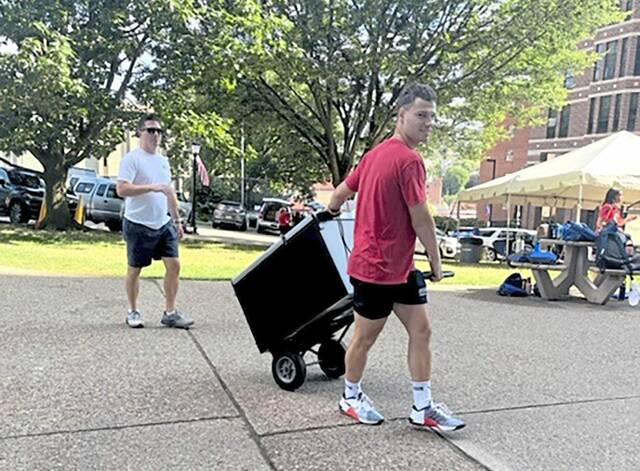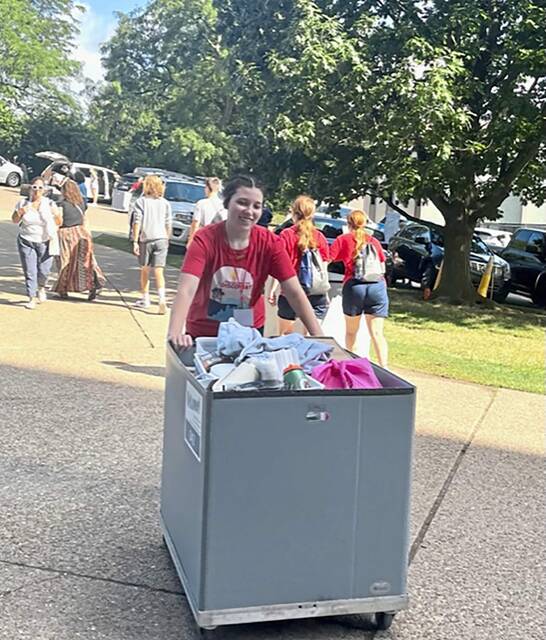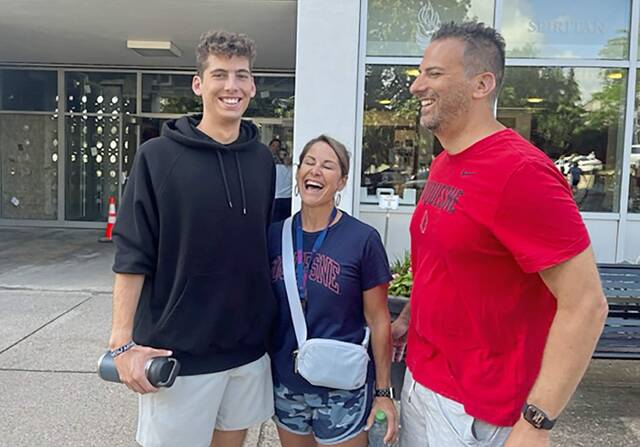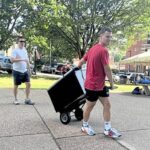Overstuffed move-in carts, frazzled parents and traffic lined up outside dorms are making a comeback this week and next as Western Pennsylvania college students arrive for fall semester classes.
Campuses, meanwhile, are trying to curb stress among the new arrivals.
Some initiatives to soothe the psyche are as involved as Carnegie Mellon University’s experiment, made permanent this fall, to shorten the semester to 14 weeks from 15.
It adds a weeklong fall semester break in October that is intended “to give more time for rest and restoration,” Provost Jim Garrett said in announcing the change to campus earlier this year.
On other campuses, the ideas are as simple as the “Ask Me” tents that will be placed Thursday across Slippery Rock University, offering “get-to-know campus” information to new students. It’s part of Slippery Rock’s “WOW” or Week of Welcome festivities on the state-owned university campus north of Pittsburgh.
Classes start next week at Slippery Rock and a number of other universities, including Penn State University. CMU and the University of Pittsburgh are among those beginning the semester on Aug. 28.
On Tuesday at Duquesne University, Aneliza Cadena, 19, a transfer student from Mexico, and her mother, Monica Nelson, 47, were footsteps from their Towers dorm destination after a multi-day trip from Monterrey, Mexico.
“It took three flights to get here, but we’re excited, and I really want to support her,” Nelson said during a pause outside the dorm. “Mexico to Houston, Houston to Philadelphia and then Pittsburgh.”
Her daughter said, “It’s my first time living alone without my parents, so I am excited and scared.”
Classes start Monday at Duquesne.
Elsewhere, too, camaraderie is in large supply.
Sydney Cochran, 20, a history major at Penn West University’s California campus, is among the volunteer upper class members who will help new students move in and get acclimated before Monday’s start of classes.
She expects to see in these new arrivals a bit of herself a few years back as a first-year student.
“Truly, it is nerve-racking, especially for students who have never been away from their parents. I was one of those students,” said Cochran, who is from North Versailles.
She said the goal of volunteers like herself is to help new students appreciate that “these are the best years of your life, and make the most out of it and the opportunities that you’re given.”
For years, Carnegie Mellon leaders have sought to ease what some there call its “stress culture,” in which students load themselves with work to the detriment of their well-being so as to keep pace with peers.
The shortened semester “aims to better meet the needs of student health and well-being by offering more time for rest and restoration throughout the semester,” Provost Garrett said in announcing that the experiment had been adopted as a permanent change.
“Over the course of the pilot, the (university) collected data and feedback to assess its effectiveness,” Garrett wrote. “In particular, students expressed that the Fall Break benefited their holistic health and well-being.”
Garrett was unavailable to discuss the change early this week.
However, Carnegie Mellon’s website said the weeklong break allows students to “catch their breath, catch up, travel for job interviews, work on research with their faculty, do a community project or any other use of their time they would find valuable.
“Such breaks are also beneficial to faculty for the same reasons,” it said.
The shortened semester means no classes from Oct. 16-20, and on Election Day, no classes will be held before 5 p.m., so discussion on democracy can be encouraged.
The last day of classes before final exams is Dec. 8.
This coming Monday, classes start at La Roche University and Seton Hill University,
In addition to Carnegie Mellon, schools with an Aug. 28 start include Carlow University, Chatham University, Grove City College, Robert Morris University, Saint Vincent College, Thiel College, Waynesburg University and Westminster College.
At Slippery Rock, chief student affairs officer David Wilmes talked about WOW and its goal of allaying student fears by giving them information to help succeed, mixed with fun events ranging from a session with academic deans to explain college-level courses, to a hypnotist performing for the new arrivals.
“It’s a new experience for them. They’re living on their own without mom and dad,” Wilmes said. “They are really responsible for themselves — getting themselves places, getting up in the morning, making sure they get to the dining hall for food and those types of things.
“They’re very excited to be here, but they’re also very trepidatious,” he said. “ ‘What’s going to happen? Am I going to make any friends?’ ”















